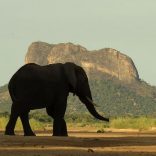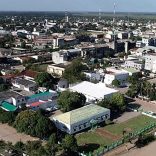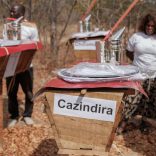Mozambique begins countrywide elephant aerial survey, seven years after last count
Mozambique: 100 detained for pangolin trafficking last year – ANAC

File photo: Noticias
At least 100 people were arrested for pangolin trafficking in Mozambique in 2019, with a total of 31 cases registered in the provinces of Niassa, Nampula, Sofala, Tete, Manica and Maputo.
The reported cases put Mozambique at the origin of pangolins trafficked to the Asian black market, highlighting the critical nature of the threat to this species in Mozambique, director general of the National Administration of Conservation Areas (ANAC) Mateus Mutemba says.
Speaking last Monday at the launch of National Pangolin Week, celebrated annually in the second week of February, Mutemba said that four of those detained were sentenced to prison terms ranging from 12 to 16 years.
The ANAC director general pointed out that the pangolin plays a very important role in maintaining the balance of ecosystems, and is responsible for controlling ant and termite numbers, keeping the soil airy and fertile for agricultural production.
An adult pangolin is estimated to consume about 20,000 ants or termites per day – more than 70 million a year, he said.
“In the Mozambican tradition, the pangolin is called eka (in the north), nkawale (in the centre) and halakavuma (in the south) and has invaluable socio-cultural value. The animal is associated with several myths. Some believe the pangolin to be an envoy of God, foreshadowing prosperity, rain and good harvests. Sometimes, the animal is seen as a messenger of negative events, such as drought and other adverse climatic phenomena,” Mutemba explained.
Before globalisation, he added, these myths and beliefs contributed to the survival of the species, but the increase in demand for traditional Asian medicine has caused a rapid decline in the pangolin population.
ALSO READ: The U.S. government recognises World Pangolin Day with ANAC and the Natural History Museum
Illegal trade in wildlife products not only creates imbalance in ecosystems and loss of biodiversity, but also harms the country’s economy by limiting opportunities to generate jobs and income for local communities through the wildlife-based economic activities.
“At the 2016 Conference of the Parties to the Convention on International Trade in Endangered Species (CITES) in South Africa, governments from around the world recommended a total ban on all trade involving African and Asian pangolins, and agreed that all eight species should be included in the CITES appendix, thereby prohibiting all international trade in this animal and its products,” Mutemba noted.
He added that this gave rise to the application of Law 5/17, of 11 May, the Law of Conservation and Sustainable Use of Biodiversity, imposing criminal penalties ranging up to 16 years in prison and various fines for masterminds, poachers, traffickers, and all other participants players in the illegal trade involving the species.
Speaking on the same occasion, the Director of the United States Agency for Development (ISAID), Jenifer Adams, said that her institution had developed a pangolin handbook in Portuguese, with a view to helping customs, migration and the police authorities identify the scales of this mammal, considered the most trafficked mammal in the world, surpassing even ivory and rhino horn.
Official United Nations World Environment Program figures estimate just over one million pangolins trafficked to the Asian black market in the past 10 years, while, in the Southern African Development Community (SADC) region alone, an estimated 50,000 pangolins are killed annually to feed the illegal trade.
According to some wildlife protection organisations, such as the International Union for Conservation of Nature (IUCN) and TRAFFIC, pangolin can be worth as much as US$350 per kilogram on the Asian black market.












Leave a Reply
Be the First to Comment!
You must be logged in to post a comment.
You must be logged in to post a comment.